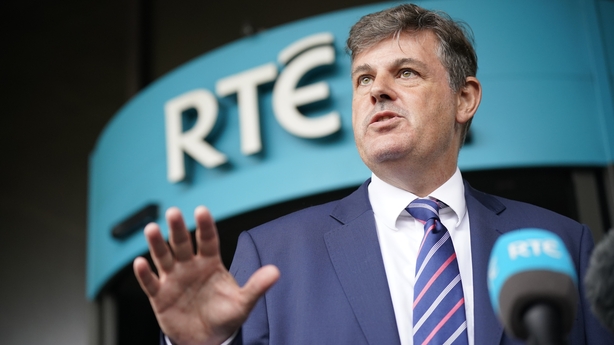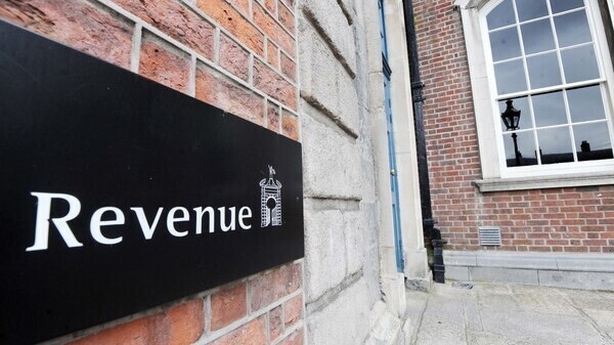What started as a controversy over undisclosed payments to presenter Ryan Tubridy has now morphed into a much more existential crisis for RTÉ.
New Director General Kevin Bakhurst is sprinting to keep ahead of multiple issues facing the beleaguered broadcasting organisation.
The most recent centres on the voluntary exit package granted to RTÉ's former chief financial officer Breda O'Keeffe, who left in 2020.
The issue has grown in significance over recent days.
Ms O'Keeffe said she had received a package at the Oireachtas Media Committee on 5 July.
The fact she was granted a redundancy agreement by her employers was raised by RTÉ trade unions on Friday 7 July with Mr Bakhurst.
After the meeting, Irish Secretary of the National Union of Journalists (NUJ) Séamus Dooley called for "clarification" about the terms of Ms O'Keeffe's exit deal.

He said many members of staff had been turned down for redundancy payments and added there was an inconsistency about how RTÉ was granting such deals.
On Monday, Mr Bakhurst gave his first media interviews as Director General and indicated he shared concerns about Ms O'Keeffe's package.
He said he was "surprised" to hear she had received an exit deal.
We need your consent to load this rte-player contentWe use rte-player to manage extra content that can set cookies on your device and collect data about your activity. Please review their details and accept them to load the content.Manage Preferences
He added he was aware some people had been refused a redundancy payment, echoing the concerns of the NUJ.
On Thursday at the Public Accounts Committee, RTÉ's Interim Deputy Director General Adrian Lynch was quizzed about the issue.
Labour Party TD Alan Kelly said the package should have been approved by all members of the Executive Board.
Mr Lynch responded: "Correct. That is absolutely factual. Never came to us for sign-off."
Current RTÉ Chief Financial Officer Richard Collins said: "I knew nothing about that package. Breda never explained anything about it."
Mr Kelly urged that it should be investigated, and Mr Bakhurst responded that "this is an issue that I take very seriously".

'Final review'
Under the terms of the 2017 and 2020 RTÉ voluntary exit programmes, any package must be subject to a "final review" by the "full executive who will confirm the final decision".
The fact that neither Mr Lynch nor Mr Collins knew about it would suggest it did not meet the criteria of being reviewed by the "full" Executive Board.
At the committee hearing, Mr Bakhurst indicated that the broadcaster would have a "wider" examination of redundancy payments.
Later that evening, he issued a statement confirming he had decided to "commission an external review of RTÉ voluntary exit schemes (2017, 2021)".
While Ms O'Keeffe's final wage was not published, her successor Mr Collins is paid in the region of €200,000 and receives a car allowance of €25,000.
It means Ms O'Keeffe's exit package is likely to have been a large sum of money, given she worked in RTÉ for 17 years.
She has declined to comment to RTÉ News about her exit agreement.
The details of the look-back into redundancy payments will feed into the Government's review of RTÉ's contractor fees and human resources.
Revenue rules

Generally, redundancy payments can be made if a role is being suppressed or if there is reorganisation within a company, whereby the work of the person leaving is taken on by others.
This is important because people who get redundancy payments benefit from lower tax bills under the Revenue Commissioners' rules.
The 2017 and 2020 RTÉ redundancy schemes state "the amount of your redundancy payments (excluding statutory redundancy) that can be received tax free in your lifetime is €200,000".
However, if a role is not being made redundant it is treated as a "fire and hire" arrangement by the Revenue Commissioners.
That means people leaving a company have to pay more tax than they would if they were made redundant.
In the past, Revenue has sought to claw back tax in relation to people who benefited from redundancy payments when in fact they had simply been paid off and someone else took their jobs for less pay.
In 2011, Aer Lingus hit the headlines when it gave 715 workers redundancy payments and then re-hired the same people on different terms.
While this is in a different league to what is being examined in RTÉ, it shows that the Revenue Commissioners will want to ensure the rules are followed.
Mr Bakhurst's move to have a long, hard look at RTÉ's voluntary exit programmes has many implications.







